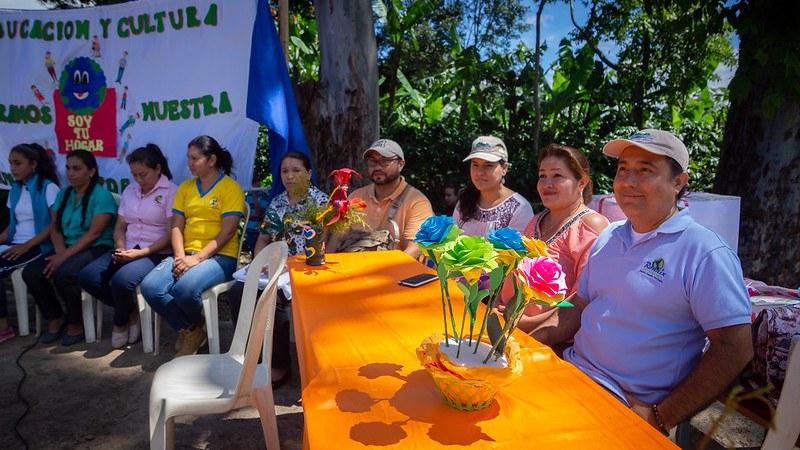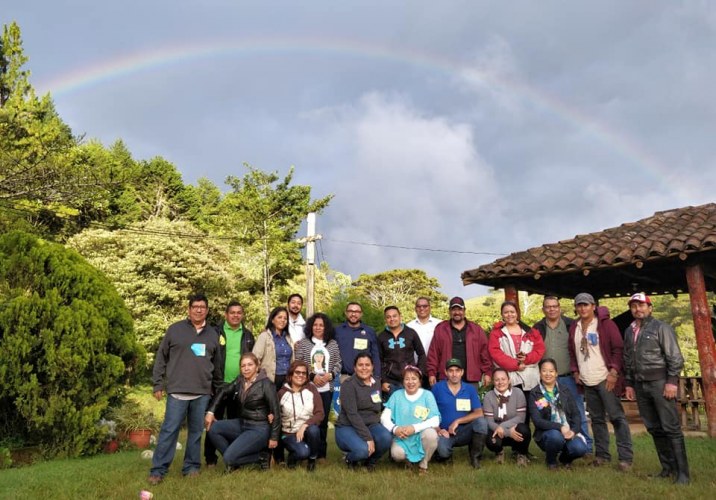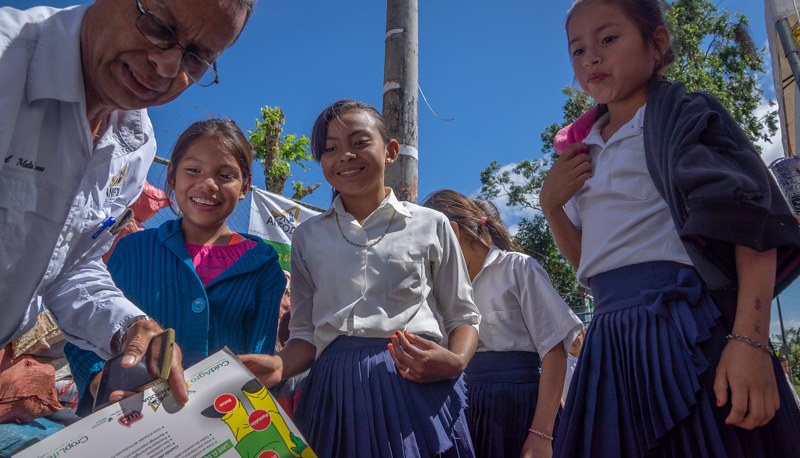Sustainable production can save a lake in Nicaragua
Sustainable production can save a lake in Nicaragua
MASLAGO: Saving the lake that feeds Nicaragua
At least 25,000 families live around Lake Apanás and around 2 million people’s access to vegetables could be affected by the loss of this lake in Nicaragua. Discover the landscape vision that Rikolto is promoting to save it.
“First we must understand the problem before we can define a solution. That’s why MASLAGO members identified the main threats to the lake: pollution and sedimentation.”

MASLAGO: a landscape vision to save the lake that feeds Nicaragua's cities
In Nicaragua, the cabbage on the shelves of Walmart supermarkets, the lettuce and tomatoes in a Subway sandwich, and the vegetables found in other national and international chains, as well as in small and medium-sized fast food companies, come from farmers' cooperatives that operate on the shores of Lake Apanás, the third largest lake in the country.
However, sedimentation, uncontrolled deforestation and harmful agricultural practices threaten the lake's survival over the next decade. Water shortages are expected to cause unemployment and compromise vegetable availability. This, in turn, will result in a less sustainable and diverse diet for urban and rural consumers.
At least 25,000 families live around the lake and around 2 million people’s access to vegetables could be affected by the disappearance of lake Apanás.
Nicaraguan vegetable farmers do not get any incentives from the public sector and in general, they are not or poorly organised.

There are an estimated 15,000 vegetable producers in Nicaragua, 90% of whom are small farmers. Annually, these farmers produce about 213,000 tons of the national demand of 230,000 tons of vegetables.
Rikolto's connection with Lake Apanás began in 2012, when we started working with the Coosmprojin, Coosempoda, Sacaclí and Tomatoya cooperatives. In total they produce 4,000 tons of vegetables per year. Most of them are purchased by wholesalers and retailers in the capital city of Managua.
From the beginning of the collaboration, Rikolto clearly saw the important link between the food supply to Managua and the livelihood of the families in Jinotega.
"The organisations had difficulties in marketing their products at fair prices. Therefore, we focused on strengthening their business and organisational management, and optimising their production methods. By doing so, we contributed to guarantee safe and quality food for consumers, less environmental impact and a better income for producing families, but we could not cover all dimensions of the problem alone", says Guillermo Gutiérrez, project coordinator of Rikolto.
This is how MASLAGO, a multi-stakeholder group initially facilitated by Rikolto, was born. It has managed to add organisations and stakeholders that are directly linked to Lake Apanás, and stimulate the sustainable management of the lake's sub-basin. This action is aligned with Rikolto's "Sustainable and Resilient Agro-Food Systems" programme in Latin America.
International Food Smart Cities programme
Rikolto supports the transition to sustainable, inclusive and healthy local food systems in cities in seven countries around the world, namely Indonesia, Vietnam, Tanzania, Belgium, Honduras, Burkina Faso and Ecuador

Who are the members of MASLAGO?
The group currently consists of 20 institutions, including vegetable cooperatives and the indigenous community that benefits from the preservation of their environment and livelihood. Private companies that benefit from continued production around the lake, non-profit organisations, and research institutions have also joined the platform.
Meet the voices behind MASLAGO in the following mini-doc (video in Spanish with English subtitles)

The challenges that MASLAGO faces...
Annually, the Jiguina, Sisle, San Gabriel and Tomatoya rivers carry an average of 4,000 tons of sediment into the lake, and this is caused mainly by deforestation and intensive land use.
Forested vegetation has been reduced by 26%, showing an annual loss equivalent to 1.24%, which represents 190.22 hectares per year.
Considering the political context of Nicaragua, one of the main challenges is to institutionalise the practices promoted by the platform and include them in national or local public policy. However, the group considers itself a neutral space in the territory, which is why it brings together so many stakeholders, including public universities.
In Managua, restaurants, fast food chains and private consumers need vegetables every day. However, that diet could change drastically due to water shortages. Beans and corn, for example, require much less water than lettuce and cabbage. If all the farmers in Jinotega were to change their crops, this would have a significant impact on the consumption of vegetables such as lettuce and cabbage in Managua.

Strategy: understanding the landscape and joining forces towards a common vision
Rikolto has used the Integrated Landscape Management approach to facilitate the initiative. The approach was designed by EcoAgriculture Partners. It is a tool that allows various sectors, including agriculture, forestry, energy, fisheries, livestock, tourism to cooperate in coming up with innovative solutions to alleviate the growing pressure on natural resources.

Working with a landscape management approach allowed us to bring together stakeholders in an initial dialogue that led to the creation of MASLAGO. The 20 participating institutions engaged in a systematic process of exchange and common understanding of landscape conditions, including their challenges and opportunities. This allowed for collaboration in planning and the development of a vision and an action plan.

The group has developed a common understanding of the landscape and defined two strategic lines of work, namely sedimentation and pollution. Each member of the platform committed to work on one of these 2 lines according to their own vision and mission. To this date, the platform has focused on development:
Risk assessment studies to understand the threats to the landscape,
Multi-stakeholder discussions on the Integrated Landscape Management approach
The elaboration of a common vision for the landscape,
The drafting of a joint action plan,
The identification of financial resources for the implementation of the plan
The implementation of the plan
We are MASLAGO
The group is made up of the following organisations, associations and companies:
Asociación Infantil Tuktan Sirpi - Jinotega
Club de Leones Jinotega las Brumas
Radio Estéreo Libre 95.3 Fm/Jinotega
AquaHub Nicaragua
Rikolto
La Cuculmeca
ANIFODA
Universidad Centroamericana
Centro Humboldt - Nicaragua
OFENA
Universidad Agraria - UNA
CIRA/UNAN-Managua
Cooperativa Coosempoda
Cooperativa Coosmprojin
Red de Agua y Saneamiento de Nicaragua
BORDA
Aldea Global
Agua para la Vida
Comunidad Indígena
RONAIX
Factsheet
Duration of the programme
Execution period: 2017 -2021
Direct beneficiaries: 25,000 families
In 2017, the MASLAGO group organised the first forum for the sustainability of Lake Apanás. At this time, all private and public organizations were invited to learn about the lake's problems and exchange information from different perspectives. Vegetable cooperatives, NGDOs, universities and research centres participated.
Results to date
The platform has developed its own action plan for the sustainability of one of the eight micro-basins of Lake Apanás, which is currently being implemented. This action plan brought together professionals and investments from the stakeholders that make up the platform, which has allowed sedimentation and contamination studies to be carried out, and the implementation of model farms with environmental plans to show the sustainability of productive landscapes. The idea is to continue developing tailor-made plans for each of the micro-basins.
The first forum on the sustainability of Lake Apanás was organised, which aroused the interest of several actors to participate in the platform and invest in the protection of the lake.
Each year at least one large campaign has been carried out to collect agrochemical containers for recycling to avoid contamination of the lake.
The studies currently being carried out will make it possible to better direct resources towards reducing sedimentation and pollution.

“Every year we organise a campaign to recycle empty agrochemical containers, with MASLAGO we expand the reach thanks to the participation of organisations such as La Cuculmeca, the indigenous community, the Tuktan Sirpi Children's Association and other private companies. Now we collect not only the containers, but also paper, cardboard and other environmentally polluting materials”
MASLAGO





